|
|
|
Sort Order |
|
|
|
Items / Page
|
|
|
|
|
|
|
| Srl | Item |
| 1 |
ID:
127066
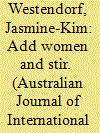

|
|
|
|
|
| Publication |
2013.
|
| Summary/Abstract |
With the changing nature of warfare and the increasing awareness of the specific gender dimensions of war and peace, the international legal framework has been expanded to address the particular challenges faced by women in conflict and post-conflict contexts. This process culminated in 2000 with the first United Nations document to explicitly address the role and needs of women in peace processes: United Nations Security Council Resolution (UNSCR) 1325 on women, peace and security. Thirteen years on, this article assesses the extent to which Australia's stated commitment to women, peace and security principles at the level of the international norm has translated into meaningful action on the ground in the Regional Assistance Mission to Solomon Islands (RAMSI). The analysis shows that despite it being an ideal context for a mission informed by UNSCR 1325, and Australia being strongly committed to the resolution's principles and implementation, the mission did not unfold in a manner that fulfilled Australia's obligations under UNSCR 1325. The RAMSI case highlights the difficulty in getting new security issues afforded adequate attention in the traditional security sphere, suggesting that while an overarching policy framework would be beneficial, it may not address all the challenges inherent in implementing resolutions such as UNSCR 1325
|
|
|
|
|
|
|
|
|
|
|
|
|
|
|
|
| 2 |
ID:
172231
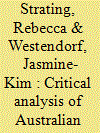

|
|
|
| 3 |
ID:
160948
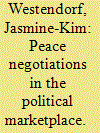

|
|
|
|
|
| Summary/Abstract |
This article investigates the implications of women’s exclusion for the nature and durability of peace processes, and whether factors that undermine peace consolidation post-settlement might be prevented through more inclusive peacemaking. It examines the Sudan-South Sudan peace process that produced the 2005 Comprehensive Peace Agreement, the roles women played in peacemaking and their exclusion from official negotiations, and the sources of insecurity post-CPA. South Sudan’s peace process shows that the exclusion of women can be understood as a canary in a coal mine: a highly visible marker of the broader exclusivity of such processes, and the complex dynamics of elite capture in war and peace processes. Women’s exclusion was the product of the region’s political marketplace, in which power and authority is secured by elites through violence and bargaining, to the exclusion of other groups. By understanding exclusion as a deliberate strategic tactic that extends from war into peacetime, I argue that the exclusion of women is not the reason why peace processes fail in and of itself, but rather the product of elite ownership of peace processes and the structure of many peace processes that facilitates and rewards such ownership, with serious consequences for the sustainability of peace post-settlement.
|
|
|
|
|
|
|
|
|
|
|
|
|
|
|
|
| 4 |
ID:
191749
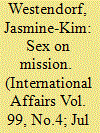

|
|
|
|
|
| Summary/Abstract |
This article critically reflects on twenty years of efforts to prevent and punish sexual exploitation by peacekeepers and humanitarian actors through the UN's zero-tolerance policy (‘the Bulletin’). I trace the assumptions and motivations that underpin the Bulletin's framing of (un)acceptable sex and investigate the operational and normative implications of its strong discouragement of sexual relationships with beneficiaries. I argue that, by construing the power differential between local communities and UN/NGO personnel as inherent, singular and totalizing, the Bulletin first reinforces conservative gender norms by framing women as perpetually and uniquely vulnerable and reinscribing gendered power imbalances. Second, it denies women agency in an era of Women, Peace and Security, laying the foundation for a detrimental separation between local people and international personnel. Third, it restructures paternalism in ways that entrench power imbalances between local communities and the organizations mandated to ‘protect’ them, reproducing colonial patterns of dealing with sex and sexuality. This analysis lays bare the tensions between care and control in how the international community responds to sexual misconduct by UN/NGO personnel and demonstrates the ramifications of these tensions for the practice and effectiveness of peace and humanitarian operations.
|
|
|
|
|
|
|
|
|
|
|
|
|
|
|
|
| 5 |
ID:
153847
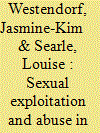

|
|
|
|
|
| Summary/Abstract |
In 2013, a UN investigation declared sexual exploitation and abuse (SEA) ‘the most significant risk to UN peacekeeping missions’. The exploitation and abuse of women and children by peacekeepers, aid workers, private contractors and other interveners has become ubiquitous to peace operations, ranging from rape to transactional sex, sex trafficking, prostitution and pornography. This article investigates the causes of SEA by interveners, and the development of policy responses undertaken by the UN and the international humanitarian community to prevent and ensure accountability for SEA. We argue that use of the umbrella term ‘SEA’, while helpful in distinguishing such behaviour from other forms of abuse, obscures the significant differences in the form, function and causes of the behaviours that fall under it, and we develop an account of the dominant forms SEA takes, based on survivor testimony, in order to better understand why policy responses have been ineffective. Our analysis of global policies around SEA demonstrates that it is dealt with as a discrete form of misbehaviour that occurs on an individual level and can be addressed through largely information-based training processes that inform personnel of its prohibition but fail to engage them in discussions of the local, international, normative, systemic and structural factors that give rise to it. We identify the structural and bureaucratic pressures that have contributed to the narrowing of approach regarding SEA to focus on individual compliance rather than the more complex set of factors at play, and which have undermined the effectiveness of policies globally.
|
|
|
|
|
|
|
|
|
|
|
|
|
|
|
|
| 6 |
ID:
172232
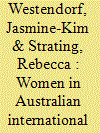

|
|
|
|
|
| Summary/Abstract |
This article reviews the participation of and challenges facing women in international affairs in Australia, with a focus on three sectors: the media, the civil service and the academy. We review the qualitative and quantitative data available, and share the results of a number of surveys and scans we have conducted ourselves: of the gender breakdown of undergraduate enrolments in Australian university courses focusing on international affairs; the gender break down of academic staff employed in politics and international relations programmes at Australian universities; the gender breakdown of authors published in the Australian Journal of International Affairs and the Australian Journal of Politics and History from 2000 to the present; and trends in the gender breakdown of citations in articles published in the Australian Journal of International Affairs between 2000–2001 and 2018–2019. We argue that although women in Australia are interested and engaged in international affairs in almost equal measure to their male counterparts, serious structural challenges continue to undermine their equitable representation in key fora and their career progression. This has clear implications for the future scholarship, practice and analysis of international affairs in Australia and beyond.
|
|
|
|
|
|
|
|
|
|
|
|
|
|
|
|
|
|
|
|
|